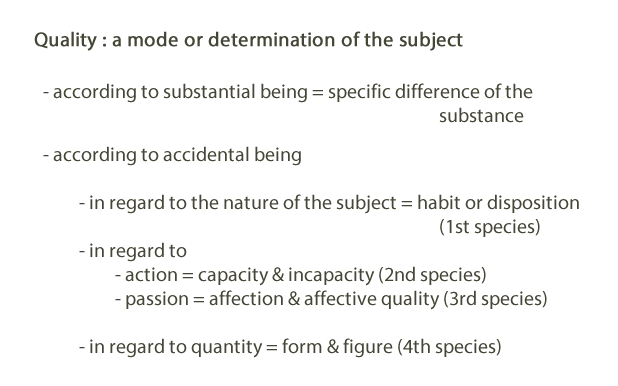Introduction to the Philosophy of St. Thomas Aquinas
Ch 5: The Predicaments
II. ACCIDENTS (cont)
1. Quality
Aristotle's principal exposition of the doctrine on quality appears in the Categories.'n A secondary treatment occurs in the Metaphysics." In both instances he follows his custom of empirical analysis, identifying and classifying the more prominent modes of being which could come under this category. The more logically conceived presentation of the topic, the standardized version as it were, we owe to his commentators, and notably to St. Thomas.
a) Nature of quality. The supreme genera of being cannot, strictly, be defined. They are irreducible modes, and the notions corresponding to them will be similarly irreducible. What is possible is to advance from an indistinct grasp of such notions to a more clear-cut one. In the case of quality, Aristotle looks for this clearer understanding of it in the effects produced by the predicament, which, though varied, are yet somehow one; for the effect of quality is always to render a thing "such and such." That, as a matter of fact, is how Aristotle first introduces quality, as the predicament by reason of which things are said to be "such and such," i.e. "qualified." In Scholastic phrase:
qualitas est secundum quam res quales dicuntur.
Doubtless, the first "qualification" of a subject comes from its substantial form, which causes a thing to be specifically distinct from other things. But this first qualification or determination alone does not suffice for the entire perfection of a being. Required, in addition, are those supervenient qualifications belonging to the order of accidents; hence the qualities issuing in these additional qualifications will come under a predicament of their own.
But how does quality itself differentiate from the other predicamental accidents? Simply by introducing something into the subject which is not introduced by the others. For, while all accidents do in a way determine the subject, all do not "qualify" it, do not cause it to be "such and such" intrinsically and formally. Quantity, say, causes the material subject to be divisible, and its parts to be extended; but this, obviously, is not the same as to "qualify" it. Quantity and quality are therefore really distinct. As for the other accidents, if in some way they can be said to qualify the subject, it is only from the outside, as it were, or in reference to something other than the subject. So that to "qualify" the substantial subject, in itself and intrinsically, can only be the effect of quality in the strict sense, such as color or those dispositions of body and soul which are named virtues. Consequently, there is ample ground for accounting quality a separate predicament.
b) The species of quality. Aristotle distinguishes four species of quality,18 which St. Thomas reorganizes under a threefold classification.19 As given by Aristotle they are:
- 1ist species: habit and disposition
- 2nd species: capacity and incapacity
- 3rd species: affections and affective qualities
- 4th species: form and figure
Habit and disposition determine the substantial subject in regard to its nature, and are said to be good or bad according as they are, or are not, directed to the perfection of the nature in question. Habit, moreover, differs from disposition as the stable from the unstable; habit, accordingly, is more lasting, more firmly established. Examples of habit: intellectual virtues (science, prudence, art), moral virtues, manual skills.
Affecting the subject as to its activity are the qualities capacity and incapacity (potentia, impotentia). Capacity disposes the subject to receive or give resistance to an activity; thus, intellect, imagination, will (others could be mentioned) are capacities through which the subject receives (exercises) the activities of these faculties. If the capacity is undermined or weakened, it is called "incapacity," which, then, does not mean the total absence of a power or faculty. Enfeebled vision would in this sense be an incapacity, but not so total blindness; or (Aristotle's example), some men are healthy because of the capacity to resist unhealthy influences, others unhealthy because of a lack of this capacity, - but not a complete lack, which spells death.
Affections and affective qualities (passiones, passibiles qualitates) are qualities which produce, or are produced by, sensible alteration; that is, qualities from which alteration begins and in which it terminates. In general, they affect the senses immediately, and include the sensible qualities of bodies and the bodily temperaments and passions (feelings and emotions). Within the third species a distinction is made on the same basis as in the first species, relative permanence and impermanence. If the quality is lasting, it is one of the "affective qualities"; if quickly passing, it is an "affection" - example, the blushing complexion versus the blush of modesty. Among the basic qualities of the third species, in Aristotelian thought, are hot, cold, dry, wet, and mixings of them.
Finally, with respect to continuous quantity the distinction of form and figure is made, which proportion and terminate it, since it must be terminated or limited. Form adds to figure the note of due proportion and refers, in a special sense, to works of art. Thus, we speak of a spherical figure, but of the form (or shape) of a vase.
As indicated some paragraphs back, quality in the wider sense may also mean a mode or determination of substance, its specific difference. Bearing this in mind, we can (with St. Thomas) adopt the following arrangement of the foregoing matter:

Footnotes
16 Cf. Categories, chap. 8.17 Cf. Metaph. A, 14.
18 Categories, loc cit.
19 Cf. Summa theol. Ia IIae, q. 49, a. 2.